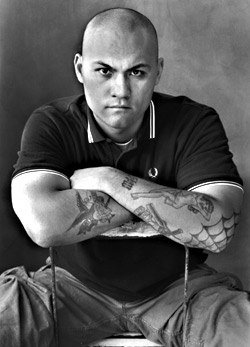Generation Blog meets Generation Kill in this memoir of the second and still ongoing Gulf War. Of all the fresh-from-the-field accounts I’ve read in the last year, Colby Buzzell’s My War: Killing Time in Iraq (Putnam, $25.95) comes closest to the standard set by Anthony Swofford’s Jarhead. A Bay Area slacker/skateboarder/dot-com drone who finds himself boomeranged (back home, broke, and living with his parents), he sees the Army as “a party frat with weapons that gave out paychecks.” It’s 2002. He’s 26 and not sure he can pass the drug test until his recruiters give him the secret mojo that eases him into the service (and nets them their commissions). His two-year hitch puts him in the Stryker Brigade based at Fort Lewis, Wash. (“massage parlor, hooker hotel, crackhouse, meth lab, used-car lot, Taco Bell”), where there’s also a skate park for soldiers! Who knew? “I wanted it to be an escape from temp work, cubicles, and data-entry,” he says of the military. In training, however, “I felt like Kenny from South Park.” But he endures the Full Metal Jacket stuff, gets an iPod before deployment, and names his machine gun “Rosebud.” Media references locked and loaded, sir!
Buzzell would be the first to describe himself as an ordinary grunt in Iraq, but a wired grunt, and his life changed when he began blogging in June 2004. (His deployment lasted about 11 months.) Embedded journalists had essentially finished their assignments after the short, successful invasion and spider-hole removal of Saddam. Since then, they’ve been essentially confined to the Green Zone. Overnight, Buzzell was promoted into the media militia, gaining a readership worldwide. To help broaden his perspective on the war, Buzzell admits, he consults Google as often as his superior officers. Between patrols, he and his buddies haunt the official Internet cafe, play video games, and create dormitory libraries from Amazon.com. Theirs is a broadband war unlike any other. Never mind Robert Duvall in Apocalypse Now (which all GIs seem to know by heart, as if they’re issued the DVD in boot camp), Buzzell quotes Will Ferrell in Old School.
His deployment is inevitably truncated when his blog is discovered after 10 weeks and officially discouraged (though not outright censored; officers actually praise its candor). The Tacoma News Tribune helped blow his cover, leading to accounts in The Wall Street Journal and on NPR—which eager publishers surely noticed. How worried was Buzzell about being punished? He asks rhetorically, “What are they going to do, send me to Iraq?” The book suffers from a third-act letdown as a result of his curtailed tour and blog. You wish he and his editors had taken more time to collate and add detail from his rich experiences. Still, Buzzell’s commingling of iPod playlists (OutKast’s “Bombs Over Baghdad” next to R.E.M.’s “Orange Crush”) and firefight descriptions (“All sorts of crazy insane Hollywood explosions were going off. I cannot put into words how scared I was”) captures the reality of a modern multitasking war. Everybody also snaps digital photos during combat, and he compares soldiers’ laptop-mixed videos to the work of Spike Jonze. Between missions, his Q&A exchanges with readers of his blog are priceless. Anguished parents of wounded and fallen soldiers write to him, asking for his take on the war. To his credit, he doesn’t overreach or pontificate (“I personally think we’re making a difference for the better here for these people”). One Iraqi reader compares the situation to Wag the Dog. To better understand his political leaders, Buzzell recommends his correspondent instead watch Dr. Strangelove. It’s a war conducted at Blockbuster.
Unlike Swofford, Buzzell doesn’t have a decade’s perspective on his war—great for blogging, but problematic for publishing. He’s a reporter, not an analyst. Also, he’s less formally educated: Bukowski, Hunter S. Thompson, and the Dead Kennedys carry more weight than the Sun Tzu and von Clausewitz sitting on his barracks bookshelves. The editors of My War don’t disguise this, and there’s something endearing and direct about Buzzell’s “me and him” constructions and his pauses to explain what Guernica is. (There are also some copy-editing errors that Putnam should not have allowed when simply reprinting blog entries.) Of course, not all books should be written after the gray-haired author has had time to sit back and reflect with a pipe between his teeth. My War is all about immediacy, and it’s an invaluable reference to the current war—however long it continues.
“I don’t know why, but I always feel like a fucking geek whenever I say the word ‘blog,'” Buzzell writes. But he’s still blogging (cbftw.blogspot.com), and he’s lately become a journalist for Esquire. Unfortunately for Seattle readers, however, he doesn’t seem interested in the conventional author tour and signing events. But if he should ever come town, I’ll bet it’ll be as the opening act for Jello Biafra.









